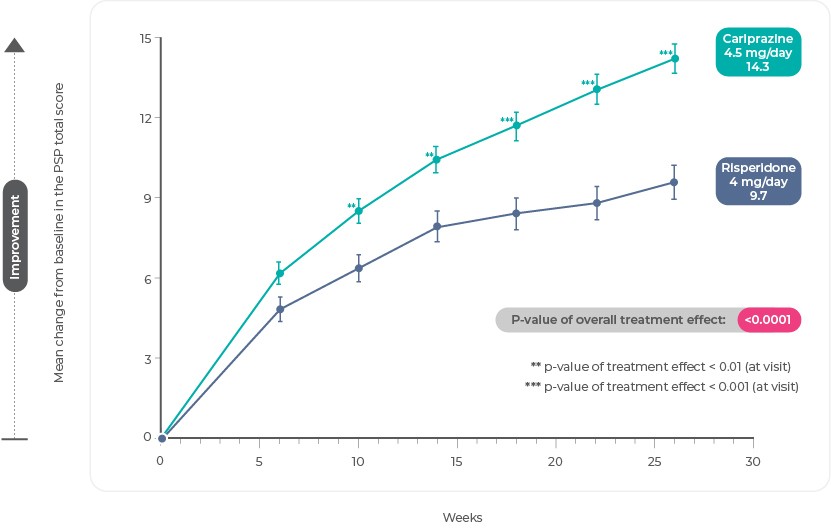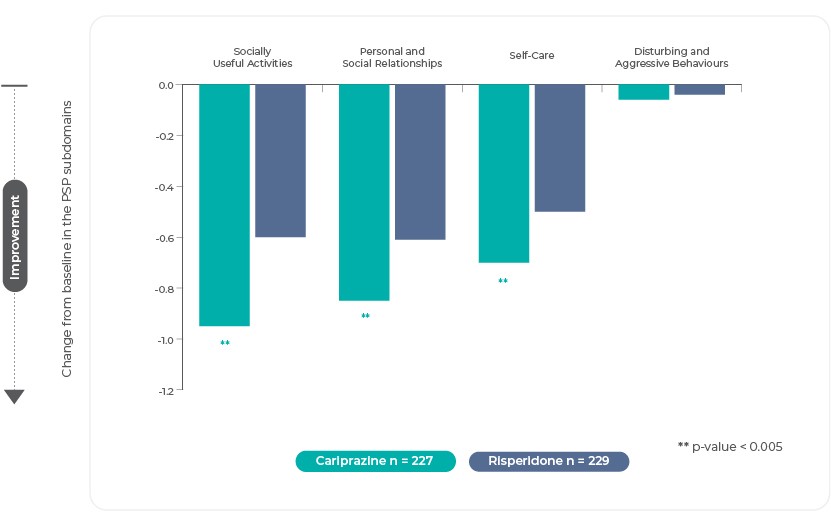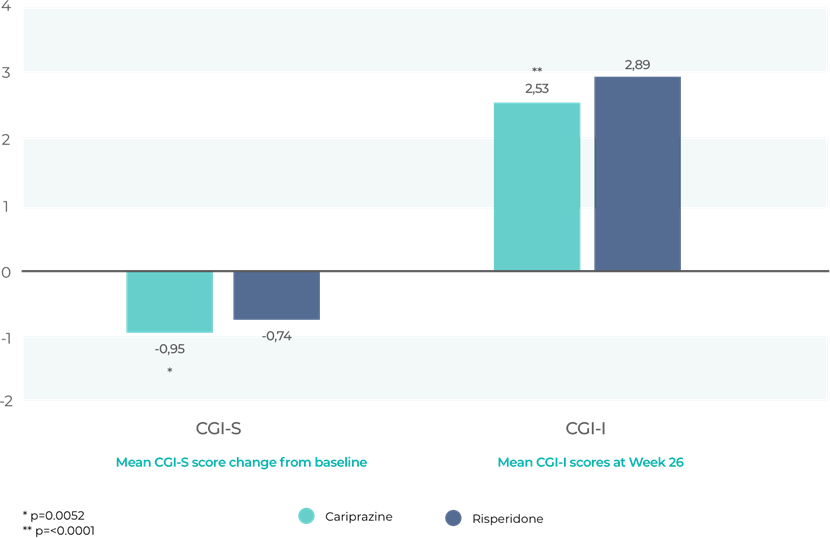
Controlling Everyday Functioning with REAGILA
- Cariprazine is more effective in improving functioning in negative symptom patients than another antipsychotic1
- The effects of cariprazine on functioning can be seen in various items of activities of daily living1
- Patients treated with cariprazine improved more and became less severely ill than patients treated with the other antipsychotic1
In this section
Functioning and Negative Symptoms
Negative symptom improvement must be accompanied by improved patient functioning in order for change to be considered clinically relevant in patients with schizophrenia2. Persistent negative symptoms and negative symptom severity have been consistently associated with worse functional outcomes in schizophrenia, both directly and indirectly through their relationship with poor cognitive outcomes. Specific areas of functioning that may be impaired by negative symptoms include occupational performance, household assimilation, social relationships, engagement in recreational activities, and quality of life3. Several measures of functioning were included in the negative symptom trial that evaluated cariprazine versus risperidone so it could be determined whether improved functioning occurred in tandem with improvement in negative symptoms1,8. Improved functioning is a sign that improved negative symptoms made a real-world difference for patients with predominant and persistent negative symptoms of schizophrenia.
The Personal and Social Performance Scale
The Personal and Social Performance (PSP) scale, originally derived from the SOFAS (Social and Occupational Functioning Assessment Scale) by Morosini et all (2000) consists of four main subdomains4:
Socially useful activities (e.g., housework, voluntary work) including work and study
Personal and social relationships (i.e., partner, family relationships, friends)
Self-care (i.e., personal hygiene, care of one’s appearance)
Disturbing and aggressive behavior
The patient’s degree of severity in the four domains is to be rated on a six-point scale from absent=1 (which means no problems on this dimension) over mild (2), manifest (3), marked (4), severe (5) to very severe (6) difficulties in the given area. A lower score is more favorable.
Out of the ratings on the four subdimensions, one total score on a 100-point scale can be created. Ratings from 100 to 91 show excellent functioning in all 4 areas; from 90 to 81 refer to good functioning in all 4 areas; from 80 to 71 refer to only to mild difficulties; from 70 to 31 refer to manifest marked and severe disabilities of various degrees; while under 30, the person’s functioning is so poor that intensive support or supervision is needed.
A variation of 8-10 points has been discussed as a clinically relevant difference5,6; with a 10-point PSP decrement as clinically relevant in the maintenance of functioning in patients stabilized with antipsychotic therapy.
Change from Baseline in PSP Total Score
PSP total score change from baseline to week 26 was assessed as the secondary efficacy parameter for cariprazine versus risperidone1,8. The least squares mean change from baseline to week 26 in PSP total score was significantly greater for cariprazine (14.30) than risperidone (9.66); the difference in favor of cariprazine was statistically significant from week 10 until week 268. The LSMD was 4.63 (95% CI, 2.71-6.56; P<.0001; effect size=0.48). Additionally, post hoc analyses of PSP total scores found that a significantly greater rate of patients treated with cariprazine (57.8%) than with risperidone (42.7%) had a >10 point improvement on the PSP (P=.0010) and a higher percentage of cariprazine patients (68.8%) than risperidone patients (55.6%) shifted to a better PSP severity category by week 26 (P=.00095)1,8.
Reference: Adapted from Németh, G. et al. Cariprazine versus risperidone monotherapy for treatment of predominant negative symptoms in patients with schizophrenia: a randomised, double-blind, controlled trial. Lancet 389, 1103–1113 (2017)1.
Change from Baseline in PSP Subscales
Change from baseline to week 26 in specific areas of functioning was evaluated through PSP subscales; the range scores for PSP areas is 1 to 6, with a lower score being favorable1. LSMDs (95% CIs) were statistically significant in favor of cariprazine versus risperidone on the PSP subdomains of self-care (-0.20 [-0.34, -0.06], P=.0044), personal and social relationships (-0.24 [-0.37, -0.10]. P=.0009), and socially useful activities (-0.35 [-0.50, -0.20], P<.0001)8. Changes were small and similar for cariprazine and risperidone in the disturbing and aggressive behaviors subdomain, which may be expected given that patients with psychotic symptoms and violent behavior were excluded from participation in the trial8. Cariprazine was once again better than risperidone in improving clinically meaningful functions that have a positive impact on daily activities for patients with schizophrenia1,8.
Reference: Németh, G. et al. Cariprazine versus risperidone monotherapy for treatment of predominant negative symptoms in patients with schizophrenia: a randomised, double-blind, controlled trial. Lancet 389, 1103–1113 (2017), Supplementary appendix1 (Graphic elaboration from text data)
Clinical Global Improvement
Global improvement in the disease state was also shown by significant differences in change from baseline for cariprazine over risperidone on the Clinical Global Impressions-Improvement (CGI-I) and -Severity (CGI-S) scales1,8. The global improvement subscale (CGI-I) requires the clinician to rate how much the patient’s illness has improved or worsened relative to baseline, with scores ranging from 1 (very much improved) to 7 (very much worse). The global severity subscale (CGI-S) is used by the clinician to record the severity of illness at the time of assessment, with scores ranging from 1 (normal, not at all ill) to 7 (among the most extremely ill patients)7.
The difference in CGI-I score at week 26 was statistically significant in favor of cariprazine (2.53) versus risperidone (2.89; P<.0001) and the rate CGI-I response (score 1 [very much] or 2 [much] improved) was significantly greater for cariprazine-treated patients (48.5%) than risperidone-treated patients (34.1%; P=.0003)8. Additionally, improved disease severity was shown by a significant difference in mean change from baseline on the CGI-S for cariprazine versus risperidone (cariprazine= -0.95; risperidone= -0.74; LSMD= -0.21 [–0.36, -0.06]; P=.0052)1,8.
Reference: Adapted from Németh Gy. Lancet 2017;389:1103-1113 (table 2)¹.
Why is Improved Functioning Important?
In order to be clinically relevant, negative symptom improvement must make a difference in a patient’s life2. For patients who struggle with everyday activities, occupational performance, relationships, and social involvement, restored functioning is expected when recovery from negative symptoms occur3. Collectively, results of these functional and global measures from the negative symptom trial of cariprazine versus risperidone support the expectation that negative symptom improvement with cariprazine was clinically meaningful as well as statistically significant1,8. Functional improvement could greatly contribute to patient rehabilitation and the ability to participate in community mental health programs, helping patients achieve improved well-being and a better quality of life.
References
- Németh, G. et al. Cariprazine versus risperidone monotherapy for treatment of predominant negative symptoms in patients with schizophrenia: a randomised, double-blind, controlled trial. Lancet 389, 1103–1113 (2017).
- EMA. Guideline on clinical investigation of medicinal products, including depot preparation in the treatment of schizophrenia. (2012).
- Foussias, G., Agid, O., Fervaha, G. & Remington, G. Negative symptoms of schizophrenia: Clinical features, relevance to real world functioning and specificity versus other CNS disorders. Eur. Neuropsychopharmacol. 24, 693–709 (2014).
- Morosini, P. L., Magliano, L., Brambilla, L., Ugolini, S. & Pioli, R. Development, reliability and acceptability of a new version of the DSM- IV Social Occupational Functioning Assessment Scale (SOFAS) to assess routine social functioning. Acta Psychiatr. Scand. 101, 323–329 (2000).
- Juckel, G. Personal and Social Performance Scale. in Encyclopedia of Quality of Life and Well-Being Research (ed. Michalos, A. C.) (Springer, 2014). doi:10.1007/978-94-007-0753-5.
- Nicholl, D. et al. Personal and social functioning in schizophrenia: Defining a clinically meaningful measure of maintenance in relapse prevention. Curr. Med. Res. Opin. 26, 1471–1484 (2010).
- Guy, W. The clinician global severity and impression scales. ECDEU Assessment Manual for Psychopharmacology (1976).
- Reagila SmPC
Lancet
Cariprazine versus risperidone monotherapy for treatment of predominant negative symptoms in patients with schizophrenia: a randomised, double-blind, controlled trial.
REAGILA CONTROLS NEGATIVE SYMPTOMSOUR PRODUCT ON NEGATIVE SYMPTOMS
Negative symptoms of schizophrenia can occur as primary symptoms that are part of the underlying pathophysiology of schizophrenia or as secondary symptoms that Negative symptoms of schizophrenia can occur as primary symptoms that are part of the underlying pathophysiology of schizophrenia or as secondary symptoms that
more…WHAT’S THE PSEUDOSPECIFICITY ISSUE?WHAT’S THE PSEUDOSPECIFICITY ISSUE?
Although cariprazine is the first and only antipsychotic to demonstrate efficacy against another antipsychotic in a large-scale trial specially designed to evalAlthough cariprazine is the first and only antipsychotic to demonstrate efficacy against another antipsychotic in a large-scale trial specially designed to eval
more…




